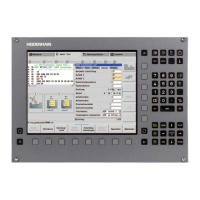January 2012 6.16 The Control Loop 887
Expanded current
controller
bandwidth
(only CC 61xx)
For axes with rigidly connected mechanics it may make sense to adjust the
current control loop using the maximum possible bandwidth to attain high
gains in the superimposed velocity control loop. For the CC 61xx controller
unit there are two procedures for increasing the bandwidth of the current
control loop:
Using machine parameter MP_iCtrlAddInfo to increase the controller
factors in the current control loop,
Proportionally differentiating feedforward (D feedforward) to optimize the
command action of the current control loop (MP_iCtrlDiffFreqFF
parameter).
Increased controller factors in the current control loop:
The dead time in the current control loop is the decisive factor for the
attainable controller factors, and therefore for the attainable bandwidth. With
parameter MP_iCtrlAddInfo, you can activate compensation of this dead
time. After activation, you have to repeat the current controller adjustment.
Usually you can then set considerably higher current controller factors. The
higher the controller factors, the larger the bandwidth of the current controller.
The bandwidth of the current control loop can be evaluated with the Bode
diagram function of the TNCopt commissioning and diagnostic software (see
TNCopt User's Manual).
However, the noise in the current—and as a result, the loudness of the drive—
increase when the current controller bandwidth is increased.
D feedforward for optimization of the current controller command
action:
With parameter MP_iCtrlDiffFreqFF, you activate feedforward with
proportionally differentiating behavior for the torque-generating current. This
way you achieve an optimized command action of the current controller.
The parameter MP_iCtrlDiffFreqFF indicates the cutoff frequency in Hertz
[Hz] up to which feedforward is active. When this cutoff frequency is reached,
feedforward is deactivated by a low-pass element. It is therefore also referred
to as PDT
1
feedforward in the following.
The following table shows the maximum possible cutoff frequency depending
on the PWM frequency of the drive. The higher the cutoff frequency, the larger
the bandwidth of the current controller regarding its command action. At the
same time, however, the noise in the current—and as a result, the loudness
of the drive—increase. If you enter 0 Hz, feedforward is deactivated.
Settings in the configuration editor MP number
Axes
ParameterSets
[Key name of the parameter set]
CfgCurrentControl
iCtrlDiffFreqFF
iCtrlAddInfo
401007
401008

